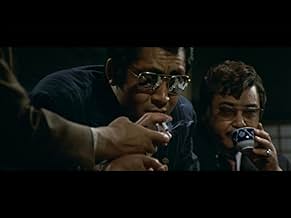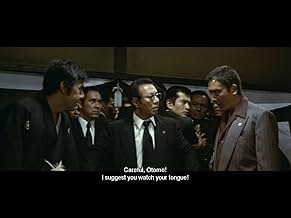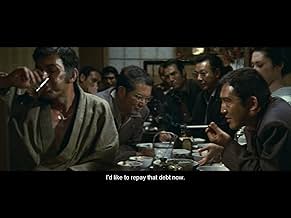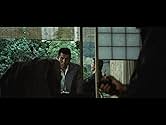CALIFICACIÓN DE IMDb
7.3/10
1.3 k
TU CALIFICACIÓN
Agrega una trama en tu idiomaWhile Hirono is in prison, his rival Takeda turns his own crime organization into a political party, whose two executives stir up new tensions in their thirst for power.While Hirono is in prison, his rival Takeda turns his own crime organization into a political party, whose two executives stir up new tensions in their thirst for power.While Hirono is in prison, his rival Takeda turns his own crime organization into a political party, whose two executives stir up new tensions in their thirst for power.
- Dirección
- Guionistas
- Elenco
Jô Shishido
- Katsutoshi Otomo
- (as Joe Shishido)
- Dirección
- Guionistas
- Todo el elenco y el equipo
- Producción, taquilla y más en IMDbPro
Opiniones destacadas
After engaging but quite confusing 3rd and 4th episodes, this 5th (and final) one I could actually follow! Not 100% of the time, but I had a much better grasp on the plot than I did in the last two- maybe to the same extent as the slightly simpler 1st and 2nd episodes.
As such, I did enjoy this one more than 3 and 4. It has a great pace throughout, maybe only faltering a little at the end, as the final few scenes don't feel as appropriate a series finale as the last few scenes in episode 4 felt.
Still, for providing more of the stuff I love about this series alone, I can't help but think this was really good. The trademark violence and chaos that defines this series has only gotten better by this point- there's an action sequence (of sorts) just over the halfway point in this instalment where the camera seems to jolt or move every time a gun is fired or a punch is landed...
...And it doesn't look cheesy; it just accentuates the brutality of what's happening in an unbelievably effective fashion. Also noticeable is how messy and clumsy so many murders and attempted murders are. I really appreciate it when a crime film emphasises how unnatural and hard it is to take a life in that kind of violent way.
As such, I did enjoy this one more than 3 and 4. It has a great pace throughout, maybe only faltering a little at the end, as the final few scenes don't feel as appropriate a series finale as the last few scenes in episode 4 felt.
Still, for providing more of the stuff I love about this series alone, I can't help but think this was really good. The trademark violence and chaos that defines this series has only gotten better by this point- there's an action sequence (of sorts) just over the halfway point in this instalment where the camera seems to jolt or move every time a gun is fired or a punch is landed...
...And it doesn't look cheesy; it just accentuates the brutality of what's happening in an unbelievably effective fashion. Also noticeable is how messy and clumsy so many murders and attempted murders are. I really appreciate it when a crime film emphasises how unnatural and hard it is to take a life in that kind of violent way.
With the authorities cracking down on organized crime, many yakuza families prolonged their existences by becoming political parties. The cops weren't fooled, but it did make it harder to prosecute them.
The talkiest of the entries and the entry burdened with the task of wrapping up dozens of loose threads, FINAL EPISODE depicts the legitimization of the crime and protection business and draws a curtain on the life of Bunta Sugawara's symbolic yakuza "torpedo".
It is as compelling for its performances as for its historical detail. Right up until the last body falls, director Fukasaku keeps the energy level high and kicks the narrative along at a heady pace.
It has been a monumental journey and a classic, unforgettable piece of cinema.
The talkiest of the entries and the entry burdened with the task of wrapping up dozens of loose threads, FINAL EPISODE depicts the legitimization of the crime and protection business and draws a curtain on the life of Bunta Sugawara's symbolic yakuza "torpedo".
It is as compelling for its performances as for its historical detail. Right up until the last body falls, director Fukasaku keeps the energy level high and kicks the narrative along at a heady pace.
It has been a monumental journey and a classic, unforgettable piece of cinema.
FINAL EPISODE is, unsurprisingly, the last of Kinji Fukasaku's five-part yakuza film series that began with BATTLES WITHOUT HONOR AND HUMANITY years previously. This handles a more political storyline, lighter on the action and heavier on the talk, that nonetheless brings the story virtually up to date and continues to enchant with its depiction of a lawless world of honour, reputation, and death.
As with the other films in this series, FINAL EPISODE has plenty of energy to keep it moving through the slower spots. The yakuza may be older and more grizzled in this film, but they're none the wiser, and the low level thugs are still committing carnage on the streets. Bunta Sugawara's Hirono is finally released from prison and discovers a world very different from the one he knew previously. The production values remain high and the excellent soundtrack continues to complement the on-screen action perfectly.
As with the other films in this series, FINAL EPISODE has plenty of energy to keep it moving through the slower spots. The yakuza may be older and more grizzled in this film, but they're none the wiser, and the low level thugs are still committing carnage on the streets. Bunta Sugawara's Hirono is finally released from prison and discovers a world very different from the one he knew previously. The production values remain high and the excellent soundtrack continues to complement the on-screen action perfectly.
Despite Police Tactics ending on a high note, I guess Toei thought there was still more to tell with this story and mandated that we get a definitive ending with nothing left unresolved. The fittingly titled Final Episode maintains the series' exceptional quality, one that doesn't feel tacked on in the slightest, easily the talkiest of the series and burdened with the task of wrapping up dozens of loose threads, it's a testament to Kinji Fukasaku's incredible talent that he and his crew were even able to fashion a film out of so little material and on such a tight schedule. Though the incidence hasn't been perfect all along, five pictures deep, the trajectory of the ongoing narrative mirrors, at the first and the last, how the instalments are approached in terms of both film-making and storytelling style. The progenitor explored the violence of the yakuza in the early post-war years as Japan rebuilt, and it's quite fitting that as both written and executed it would bear wild, chaotic energy that was a veritable shot in the arm for the genre. Granted the pacing of this one is filled with stops and starts due to the loose structure of its script and the big players are mostly kept to the sidelines for the majority of the runtime; I'll be damned that it follows in the same vein as Deadly Fight in Hiroshima thanks to some exceptional performances from its cast, all of whom deliver fantastic performances. As compelling for its performances as for its historical detail, Final Episode keeps the energy level high, its technical aspects strong and its cast thoroughly engaging right up until the last body falls and the Battles finally end, one age of the yakuza fades to be replaced by another.
I finished the whole jingi series in 2 day and I'm rewatching the first movie and if I were to summarize this film it was basically an relativly peaceful ending to a man who lived in loyalty at the start and slowly started to get involved in a yakuza war with betral and a big physiological warfare.
Overall I absolutely loved this series and planning to watch more yakuza film and I would recommend it to anyone's who's interested.
Overall I absolutely loved this series and planning to watch more yakuza film and I would recommend it to anyone's who's interested.
¿Sabías que…?
- TriviaIn one of the final scenes, several yakuza members approach a theatre playing Onna Toseinin, aka Onna toseinin (1971) and ogle the poster featuring Sumiko Fuji as the latter movie's theme music plays. Onna Toseinin is a "ninkyo eiga" or "chivalry film" in which yakuza are portrayed in a romanticized way as honorable, upstanding citizens, or cool, wandering gamblers. This is certainly meant as a strong contrast to the "jitsuroku eiga" / "actual record film", or true crime style of this Battles Without Honour and Humanity series, in which modern yakuza are more accurately portrayed as brutally destructive, craven goons engaging in chaotic violence and murder. Ironically, Yumiko Nogawa who appears in this film as a yakuza wife, 12 years earlier appeared in an early ninkyo eiga series of her own as a similar wandering woman gambler character, Toba no mesu neko (1965).
- ConexionesFeatured in Game One: Rage, Might & Magic: Heroes 6 (2011)
Selecciones populares
Inicia sesión para calificar y agrega a la lista de videos para obtener recomendaciones personalizadas
Detalles
- Tiempo de ejecución
- 1h 40min(100 min)
- Mezcla de sonido
- Relación de aspecto
- 2.35 : 1
Contribuir a esta página
Sugiere una edición o agrega el contenido que falta




























